Explore the 2025 Ottawa real estate market forecast, including pricing trends, neighbourhood demand, and key tips for homebuyers and sellers.
Overview of Ottawa’s 2024 Housing Market
As we step into 2025, Ottawa’s real estate market remains one of Canada’s most stable. In 2024, the city experienced a modest rebound after the market correction of 2022–2023. Average home prices edged up slightly, while mortgage rates began to stabilize, offering some relief to buyers.
Here’s what defined 2024:
Detached homes saw modest gains (~3–5%)
Condo sales surged due to affordability
Interest rates hovered around 5.25%, down from peak highs
Newcomer demand helped keep inventory tight
Government incentives (like First Home Savings Account) supported first-time buyers
These dynamics laid the foundation for Ottawa’s promising 2025 outlook.
Economic Drivers Behind Ottawa’s Real Estate in 2025
Several key factors are fueling growth in Ottawa's housing market this year:
Government Stability: As Canada’s capital, Ottawa remains cushioned by a large base of federal employees, offering economic consistency.
Population Growth: Increased immigration targets and interprovincial migration (from Toronto/GTA) are driving housing demand.
Interest Rates: Forecasts suggest a slight dip, possibly into the high 4% range, making mortgages more accessible.
Tech Sector Expansion: Kanata’s tech hub continues to attract high-income professionals.
Together, these drivers create a healthy environment for both buyers and sellers.
Pricing Predictions: Will Ottawa Homes Get More Expensive?
Yes—modestly. Experts predict a 4% to 6% increase in home prices by year-end, with detached homes leading the charge.
Source: CREA & local board forecasts
Inflation and rising construction costs may continue to put upward pressure on pricing, especially for new builds.
Hot Neighbourhoods Expected to Surge in 2025
Looking to invest or relocate? Watch these high-growth neighbourhoods:
Riverside South – Fueled by LRT access and new schools
Barrhaven East – Family-friendly, affordable, growing rapidly
Orleans (Avalon West) – Continued French-immersion and suburban development
Vanier & Overbrook – Urban infill and revitalization driving value
With new infrastructure and community centers, these areas offer strong appreciation potential.
Rental Market Forecast in Ottawa
Ottawa’s rental market remains tight with vacancy rates under 2.5%. Expect rents to rise 5%–8% in 2025, especially near post-secondary institutions and LRT lines.
Average monthly rent projections:
1-Bedroom: $1,800+
2-Bedroom: $2,250+
3-Bedroom: $2,800+
Investors can expect stable returns as student and newcomer populations increase.
Impact of New Developments & LRT Expansions
The Stage 2 O-Train LRT is a game changer, connecting east-west corridors with faster public transit. Expect a ripple effect in:
Real estate prices along new lines
More high-density developments in LRT-accessible zones
Improved commute times, boosting suburban demand
Major projects like Zibi, Greystone Village, and new infill near LeBreton Flats will continue reshaping Ottawa’s skyline.
Affordability Concerns and First-Time Buyers
Affordability is a growing concern. Here’s how first-time buyers can stay competitive:
Use your FHSA to save tax-free
Get pre-approved before shopping
Explore co-buying or rent-to-own models
Consider condos or townhomes as entry points
Also, the federal First-Time Home Buyer Incentive may still apply depending on your income.
Inventory and Supply Trends to Watch
Inventory remains below historical averages, causing bidding wars in some areas. However, developers are pushing new builds in:
Riverside South
Stittsville
South Orleans
Expect longer build timelines due to labor shortages and permit delays.
Ottawa Real Estate Investment Opportunities in 2025
Thinking of investing? These asset classes offer good returns:
Pre-construction condos in Orleans and Westboro
Multi-family units near universities (uOttawa & Carleton)
Short-term rentals in Centretown and ByWard Market
Make sure to research zoning rules and short-term rental regulations before jumping in.
Challenges for Sellers in 2025
While demand is strong, sellers face more informed buyers. Challenges include:
Longer time on market in high-priced segments
Need for staging and repairs to attract buyers
Overpricing pitfalls as buyers get rate-savvy
Work with a REALTOR® who understands Ottawa’s micro-markets for best results.
Best Practices for Buyers in Ottawa in 2025
Check local school catchment maps
Tour areas during peak traffic times
Use local mortgage brokers for better rate access
Consider resale and future value before buying
Hiring a local REALTOR® with Ottawa knowledge can give you the upper hand in competitive bidding situations.
Technology and Real Estate in Ottawa
The digital era has changed how homes are bought and sold:
AI pricing tools offer smarter comps
Virtual staging and 3D tours save time
Smart home upgrades are now buyer expectations
Tech-savvy buyers are using platforms like HouseSigma, Zillow, and CREA to research listings in real time.
Ottawa vs Other Canadian Markets in 2025
Ottawa continues to outperform in value-for-money, especially compared to:
Add in lower crime, bilingual education, and abundant greenspace—and Ottawa shines bright.
FAQs About Ottawa Real Estate in 2025
1. Is it a good time to buy in Ottawa in 2025?
Yes, especially before rates drop further and prices rise more steeply.
2. Will Ottawa home prices drop?
Unlikely. Prices are expected to rise 4%–6%, barring major economic shifts.
3. Where is the best area to invest in Ottawa real estate?
Try Riverside South, Barrhaven East, or Overbrook for solid ROI.
4. What’s happening with the rental market?
Rents are climbing due to high demand and low supply.
5. Are new builds a good option?
Yes, especially in growth areas—but be prepared for delays.
6. Is Ottawa better than Toronto for families?
Many would say yes—Ottawa offers affordability, schools, and green space in spades.
Final Thoughts: Ottawa Real Estate Outlook in 2025
Ottawa’s housing market is entering a confident phase. With strong demand, modest price growth, and ongoing transit and development projects, the city is positioning itself as one of Canada’s best places to live and invest.
Whether you're buying, selling, or renting—understanding the trends in 2025 can help you make smart, informed choices. 🏡


